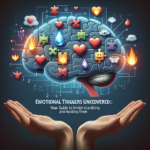The Brain on Drugs: Exploring the Long-Term Effects of Substance Abuse
Introduction
In a world where substances often promise relief from stress, pain, or the mundane, the battle against addiction has become a pressing issue that affects millions globally. The Brain on Drugs: Exploring the Long-Term Effects of Substance Abuse is not just a clinical title but a critical inquiry into how various substances alter our most vital organ. Understanding these effects is essential for individuals, families, and communities grappling with addiction. This article aims to illuminate the profound impacts of substance abuse, unravel the science behind chemical dependence, and provide actionable insights to foster recovery and resilience.
Understanding the Brain’s Architecture
Before delving into the dark ramifications of substance abuse, it’s crucial to understand the architecture of the brain—the very organ that would be changed forever by drugs. The brain comprises multiple regions, each responsible for different functions. The notable areas include:
- Prefrontal Cortex: Responsible for decision-making and impulse control.
- Amygdala: The emotional hub, influencing fear and pleasure.
- Nucleus Accumbens: Central to the brain’s reward circuit, it plays a major role in addiction.
Understanding these structures lays the foundation for a more profound comprehension of how drugs affect their functionality.
The Neurochemical Playground
Every drug interacts with neurotransmitters—chemical messengers in the brain. Below are key substances and their neurochemical pathways:
| Substance | Neurotransmitter | Effect on the Brain |
|---|---|---|
| Cocaine | Dopamine | Increases levels, leading to intense euphoria |
| Heroin | Endorphins | Activates opioid receptors, numbing pain |
| Alcohol | GABA and Glutamate | Inhibits brain activity, causing relaxation |
| Cannabis | THC | Binds to cannabinoid receptors, affecting memory |
These interactions can bring immediate pleasure but can also lead to long-term changes requiring us to heed the warning bells.
The Long-Term Effects of Substance Abuse
1. Cognitive Impairment
One of the primary concerns about chronic drug use is its impact on cognitive functions. Studies show that prolonged substance abuse can lead to deficits in memory, attention, and learning. For instance, research has indicated that heavy alcohol consumption affects the hippocampus, a region critical for forming new memories.
Case Study: The Impact of Alcohol on Memory
A study involving college students revealed that those who engaged in binge drinking exhibited significant memory lapses and lower academic performance. This highlights how the brain on drugs can hinder a person’s ability to retain information and make sound decisions, potentially altering life trajectories.
2. Emotional Instability
Chronic substance abuse can result in severe emotional disturbances. As the brain adapts to these substances, individuals often find themselves battling heightened anxiety, depression, and even psychosis.
Case Study: The Connection Between Cocaine and Mood Disorders
An analysis of individuals with cocaine addiction revealed a marked increase in anxiety and depression symptoms. These findings emphasize the importance of mental health awareness and the need for dual diagnosis treatment plans that address both addiction and co-occurring disorders.
3. Changes in Brain Structure
Prolonged substance abuse can physically alter brain structures. For example, neuroimaging studies have shown that individuals with a history of methamphetamine abuse often have reduced gray matter volume in key areas related to decision-making and impulse control.
Case Study: Methamphetamine’s Toll on the Brain
Research published in Archives of General Psychiatry found that meth users exhibited significant brain atrophy compared to non-users, linking substance use to irreversible changes that affect daily functioning and overall life satisfaction.
4. Addiction and the Reward System
One of the most insidious effects of drug use is the manipulation of the brain’s reward system. Over time, drugs can hijack this system, leading to compulsive behaviors that prioritize substance use over healthier life choices.
Case Study: Gambling Addiction and Substance Abuse
A cross-analysis of gambling and substance abuse suggests a similar neurological pathway where both addictions stimulate dopamine release. This connection sheds light on why individuals struggling with one addiction might easily fall into another.
5. Physical Health Consequences
Substance abuse doesn’t just ravage the brain; it can also have devastating physical health effects. Chronic use leads to a myriad of health problems, including cardiovascular issues, respiratory problems, and liver disease.
Case Study: The Impact of Alcohol on Physical Health
Research has shown that heavy alcohol drinkers have a significantly higher risk of developing liver disease compared to non-drinkers. This situation illustrates how the brain on drugs can compromise not only mental but also physical health.
Recovery: Rebuilding the Brain
While the effects of substance abuse can be severe, recovery is possible. Understanding the brain’s plasticity—the ability to adapt and change—provides hope.
Therapeutic Approaches
Cognitive Behavioral Therapy (CBT): This evidence-based approach helps individuals identify and change negative thought patterns associated with drug use.
Medication-Assisted Treatment (MAT): Combining medications with counseling can effectively manage withdrawal symptoms and reduce cravings.
- Support Networks: Engaging with communities through support groups like Alcoholics Anonymous can provide the necessary encouragement and accountability for recovery.
Conclusion
The Brain on Drugs: Exploring the Long-Term Effects of Substance Abuse reveals a challenging truth: substance abuse alters our brains and lives in profound ways. Yet, while the journey to recovery may be long and daunting, understanding the intricacies of how drugs affect the brain can empower individuals to seek help, foster resilience, and reclaim their lives. By prioritizing education, intervention, and support, we can mitigate the impacts of substance abuse and help pave the way for healthier futures.
FAQs
1. What are the main long-term effects of substance abuse on the brain?
Long-term substance abuse can lead to cognitive impairments, emotional disturbances, and structural brain changes.
2. Can recovery reverse some of the brain damage caused by drugs?
Yes, the brain is capable of some degree of recovery through rehabilitation and therapy, especially if action is taken early.
3. How does cocaine specifically affect the brain?
Cocaine primarily increases dopamine levels, leading to short-term euphoria but long-term cognitive and emotional issues.
4. What role does support play in recovery from substance abuse?
Support systems are vital for accountability, emotional stability, and encouragement during the recovery process.
5. Are there therapies specifically designed for dual diagnoses (mental health and addiction)?
Yes, integrated treatment plans can effectively address both mental health disorders and substance addictions concurrently.
By expanding our understanding of The Brain on Drugs: Exploring the Long-Term Effects of Substance Abuse, we foster a society that values prevention, education, and healing. Let’s work together to create a healthier future.

















